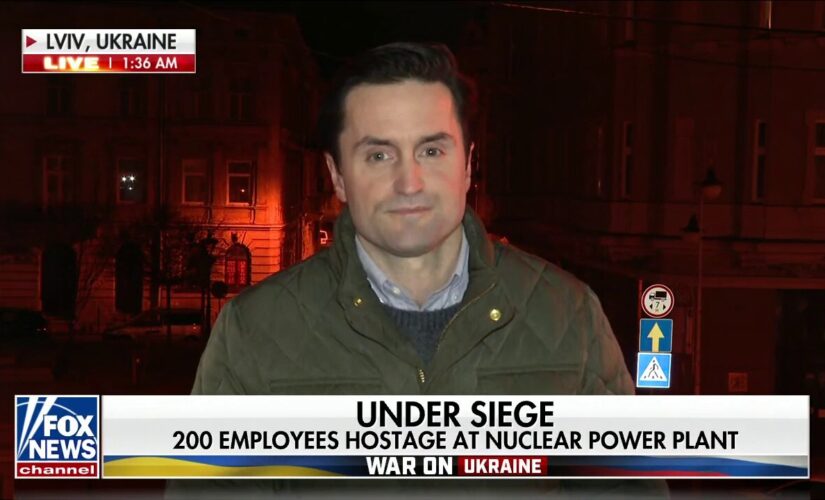NEWYou can now listen to Fox News articles!
More than 200 workers have been working at gunpoint since Russian soldiers seized the Chernobyl Nuclear Power Plant (NPP) on Feb. 24. Overnight shift employees who were supposed to work only for 12 hours have been running operations at the plant for two weeks.
Among the nuclear engineers there is Natalia Ruemmele’s 63-year-old father.
“Basically, the power plant is held by people who have no clue about the nuclear security protocols,” Ruemmele told Fox News via Zoom from Munich, Germany.
For more than 40 hours now, the power has been cut off at the NPP, leaving facilities on reserve diesel generators that “have a 48-hour capacity,” according to transmission system operator Ukrenergo.
“After that, cooling systems of the storage facility for spent nuclear fuel will stop, making radiation leaks imminent. [Russian President Vladimir] Putin’s barbaric war puts entire Europe in danger. He must stop it immediately,” Ukraine’s Foreign Minister Dmytro Kuleba tweeted, calling on the international community “to urgently demand Russia to cease fire and allow repair units to restore power supply.”
Despite the power loss at Chernobyl, the International Atomic Energy Agency (IAEA) reported it “sees no critical impact on safety.”
A satellite image with overlaid graphics shows military vehicles alongside Chernobyl Nuclear Power Plant in late February.
(BlackSky/Handout via REUTERS)
Olga Kosharna, an expert in nuclear energy and nuclear safety who previously worked at the State Nuclear Regulatory Authority of Ukraine, said IAEA has been an “impotent structure which has no mechanisms of influence on an aggressor who violates all international agreements.”
Kosharna said that she believed Russia’s actions at the NPP qualified as a crime under the International Convention for the Suppression of Acts of Nuclear Terrorism, and that the International Criminal Court should hear it.
Ukrainian intelligence officials said Putin has ordered “the creation of a technological catastrophe,” adding, “the responsibility for which the occupiers will try to blame on Ukraine.”
Chernobyl is the site of one of the world’s worst nuclear disasters, where a nuclear power reactor exploded and burned in 1986.
“The Chernobyl disaster caused irreversible damage to the environment that will last for thousands of years,” Greenpeace announced in its 2016 study of the accident. “Never in human history has such a large quantity of long-lived radioisotopes been released into the environment by a single event.”
US NUCLEAR EXPERTS ‘MINDFUL BUT NOT FEARFUL’ OF RADIOACTIVE THREAT AMID RUSSIA INVASION OF UKRAINE
Olexi Pasyuk, an environmental expert from the nongovernmental organization Ecoaction, said he did not expect a “nuclear meltdown” but pointed to long-term concerns: “The simple fact that there is a military vehicle moving on exclusion zone is concerning because this is the area for special rules which are supposed to minimize impact and avoid radioactive dust there.”
Ruemmele, like many in her hometown of Slavutich, where most Chernobyl nuclear plant employees lived, has been worried about the health and well-being of her father.
“There are no living conditions at the power plant. There is no heating, there are no sleeping arrangements and food is getting scarce. They get a small portion of porridge once a day. If they’re lucky, they get some bread as well. Basically, people are hungry,” she said.
Families have cried out for the hostages’ freedom and for the Red Cross to be able to deliver food, medicine and other supplies.
“My father has health issues, he has high blood pressure and there is no medication there,” said Ruemmele, who has written both to IAEA and the Red Cross to guarantee a safe corridor for a new shift to take over. “There is a shift that is willing to take over, but they are stuck in Slavutich. No one could guarantee a cease-fire for them to access the plant.”
Ukrainian National Guard, Armed Forces, special operations units exercise as they simulate a crisis situation in an urban settlement, in the abandoned city of Pripyat near the Chernobyl Nuclear Power Plant, Ukraine, Feb. 4, 2022. Russia’s attack on a nuclear power plant in Ukraine has revived the fears of people across Europe who remember the 1986 Chernobyl disaster.
(AP Photo/Mykola Tymchenko, File)
CLICK HERE TO GET THE FOX NEWS APP
While Chernobyl’s three nuclear reactors were shut down in 2000 and the facility no longer was providing energy to Ukraine, it still needs to be maintained as it undergoes a decommissioning process. The Chernobyl Exclusion Zone, the area within a roughly 18-mile radius of the plant, has consisted of sets of facilities requiring continuous operations, including uninterrupted electricity for ventilation.
“I’m praying that they will resolve issues. If not, we all are doomed. If they don’t resolve issues with electricity to Slavutich, as well as heating and water supply – the city is dead. We have already been cut off from food supplies since Feb. 24,” Vadym Pobiedin, a former NPP employee and Slavutich resident, told Fox News.




